
Disclaimer: the views and opinions expressed in this blog are not necessarily the views held by FringeReview. Please address any complaints concerning anything offensive or inaccurate in these blogs to our editors at gubbins@fringereview.co.uk
Visit our current Column here.
Archive for 2011
28th December 2011
With a new year approaching I am going to briefly ruminate over the theme of originality. 2011 was a year for even more derivative work than ever before. Remakes, rehashes, reworks. Novels brought to the stage, films brought to the stage, reruns and sequels. Even trilogies have become excuses for simply reviving and repeating themes and storylines.
With the world on its financial and possibly environmental knees and increasingly unable to justify recycling old solutions that partly created the problems they supposedly seek to address, I am wondering what 2012 will bring. And I’m not wondering that much. As theatre companies are forced to pander to televisual cliche in the name of community tick-boxing, and as repetition of derivative image creates more of an urge to transpose television and film onto the stage, raw theatre, though still there, is going to lack in the new year. As festivals crank (and recrank) their machinery, with little new cash injection, hoping for growth over authentic sustainability, I think creatvity will be stretched thin. We google our originality these days and cut and paste images, not only literally, into set design and writers’ imagination, but also symbolically, as originality eludes us, its existence even quiestioned, its right to exist even challenged. The new originality is a hash and mashup, celebrated for unique re-combination and fusing of existing puzzle pieces, rather than facing the scary blank canvas of possibility with a new brush and just a palette of primary colours.
It shocked me in 2011 what was labelled as "original". We’ve lowered our standards by lowering our expectations. Acting talent still often breaks through to be spine-tingling, but writing (especially comedy) is lost in repetition and re-mixing material that was never that great in the first place. There needs to be a reaction against repetition. But to start that we’d have to start unlocking ourselves from the "lockdown" of a wretchedly content Facebooked world. Happy old year!
I invite Fringe arts makers to dig deeper, not just into google or the collective subconscious of cliche (which has its own artistic value I do not deny) but into the place of original possibility that can spawn great work, at a time I believe we most need it. Let’s seem newness and actually enjoy the thrill of decluttering our field. Burn the ground and let freshness through. I’m tired of reviewing stage versions of films, and even stage versions of stage versions. I demand somethnig new, something original, something that leaves me a bit lost for all the right reasons.
14th October 2011
I noticed in Edinburgh a lot of shows were making a return with the same offering as 2010. Some were even back for the third or even fifth time! Brighton’s comedy and comedy fringe scenes show a similar pattern and perhaps it isn’t surprising, given the current economic climate. Clever Peter, the sketch troupe are here with a greatest hits show, and Thom Tuck (he of the Penny Dreadfuls) bring s a fully rounded version of a work-in-progress he briught to the Fringe last year.
One thing I would say about this year’s comedy Fringe is that I don’t envisage any of the returners resting on their laurels. There’s always a freshness to the comedy at Three and ten and a theatrical feel to a lot of the comedy. It’s good fringe fare and the closeness of front row to stage (and also back wall to stage!) also keeps the performers on their toes.
But come 2012, even if we are still in economic meltdown, the fringe scene will need more newness. Recessions should be a time of using the resources we have, not only to revisit and repeat but also to invent and dream. So, I want to see a lot more premieres at next years Comedy Festival and Comedy Fringe. They might all be back then, but we certainly won’t be.
10th September 2011
So, we upped our coverage of Amsterdam Fringe and reviews are pouring in from our London team. We also upped our reviewing at Camden in London and I’m glad to see so much vibrant Fringe theatre in these, the recessionary times.
There’s less outstanding work around at the moment but plenty of exciting experimental work. One way out of this triple dip downturn is going to be a love of experimentation. I think one of the things that caused this recession in the world was a greed that led to repetition and cynical anti-innovation. Sadly that was to be seen in Edinburgh, especially in the comedy genre. Too many shows were making yet another return, milking past glories, upping prices but not creative games. A lot of the three star shows were actually more worth seeing for their attempt at newness, freshness and originality. Sadly they don’t have the budgets to create the finished and shiny feel, but I’d go for rough originality over polished repetition any day.
31st August 2011
Amsterdam – The truly different Fringe
So, here I am, at the start of the Amsterdam Fringe, lodged beside a canal in the breathtaking apartment of fellow FringeReviewer Mike Fitzgerald. Today was the last day of the Fringe’s prestigious Critics Masterclass and we had a wonderfully heated discussion about objectivity. Of course I was right and they were all..; right as well. Yeuch.
It’s more of a challenge here reviewing theatre because there’s a mood of experimentaton that pervades the programme. Yes, there are plays here, such as Orange Tree Theatre’s Winter. But there’s also a lot of less categorisable work such as Trickster’s The Adventurous Men, described as ‘an improvisation in five chapters.’
The Language No Problem (LNP) emblem means that shameless non-speakers of Dutch can enjoy a big chunk of this Fringe, though we do intend to do a bit of reviewing in Dutch (not edited by yours truly, I hasten to add). But I think (and I hope) our reviews will be descriptive but never "spoiler"-based as we try to make sense for you, the reader, of much of the avant-garde and label-defying work that calls itself theatre here.
Not all plays have a beginning, middle and an end. And not all theatre has to fit into neat categories (The Edinbugh Fringe would have a nightmare categorising some of these). Amsterdam Fringe is an adventure and a celebration of new work in many cases, and performances that fuse media, styles and even different takes on the Zeitgeists.
I’m looking forward to the culture shock tomorrow, Day One. Get along to this unique of Fringes.
30th August 2011
Repetition or Continuity?
I don’t know where to start with this so I’ll dive straight in. Repetition is rarely nourishing. Doing this again and again for the sake of it smacks of laziness, insecurity, and sometimes uncreativity. There are lot of people now "using" festivals. You can’t or shouldn’t "use" festivals. Festivals are supposed to be celebrations. We go to find and celebrate good work. And it really does feel like celebration when we find it. We enthuse, tell the world and recommend, recommend, recommend.
Continuity is to be found in traditional farming, indeed, in all traditions. Here, things may be repeated because continuity feels nourishing, healthy, and good for the world. We may develop a piece of work, or create several drafts of a painting. We may also develop a theme in our artistic work and continuity becomes the thread that runs through it all. Healthy continuity feels like good flow.
Repetition, when it becomes superficial, and wholly instrumental is a bit cynical and often disappointing. And, there’s too much repetition at the Edinburgh Fringe. Some companies bring a show back year after year just to "milk the audience" of its money. Some venues are just doing the same things year after year having lost an ability to imagine anoything else, and it all feels a bit of a downer.
There’s a comfort in the repetition that feeds my own laziness. I become glad nothing has changed because it all becomes easily familiar. The same venues, the same catering, the same show boards, the same box offices, the same programming, and the same shows and companies coming back again and again with potted productions.
Bane was back with 2 and 3 and yet that felt mostly like continuity. I confronted Joe Bone about it at the Pleasance Dome (same drapes) and he defended pretty well the need for a trilogy for the Bruce Bane story.
Yes, continuity creates flow and then there’s an evolving, healthful story. Repetition feels more like a nice, nurturing rhythm, whereas repeating for the sake of it, or for purely commercial reasons feels negative, cynical and, most of all, uncelebratory.
The Edinburgh FESTIVAL Fringe. Festival….Read my lips: celebration.
29th August 2011
Repetition or Continuity?
So, another Fringe comes to an end. I notice a few venues shout out that they’ve broken box office records again, and a few, including the Fringe, are more humbly silent. I’m delighted to see the Fringe celebrate another successful Fringe without worrying too much about growth, growth, growth, at least at the end. More shows, but not record-breaking sales. And so what? As I’ve said before, growth fixation is tantamount to greed, and that got the whole world economy into the fix it is still in.
The Assembly Bar was magical on the final evening, buzzy after a while, and authentically relaxed, less frenzied. A lot of people had already gone home on the 28th, and this recession has (I hope) made us value the simple comforts of home a bit more – a bottle of nice wine from the local shop, and not a fiver a glass from the bar.
The Fringe in Edinburgh felt more relaxed, more pleasant, with plenty of fine work, a bit of outstanding work, but no shortage of creativity and a powerful sense of effort and endeavour.
The stars have gone even more crazy with just about every show getting a four (even the infamous Sweet Charity cult turkey – I heard it was quite good actually). Stars are meaning less and less as the world of press and PR (us included) disappears further up its own collective ass. The paper dailies are still wondering what else they can stuff in a free cloth back in order to sell a newspaper, and they are all playing snooty-snooty and witholding stars like a tired exam board. We are going to take a serious look at ditching stars next year altogether. Now, that sounds really epic, but how small we all really are at this enormous Fringe.
Highlights were our awards given three fine shows (go, on click and look them up! Look them up!), and I do love putting silver lettering on the teapots.
23rd August 2011
Don’t say I didn’t warn you…
We’ve now seen several shows we’ve seen before, in other regions, or at other Fringe festivals that aren’t doing as well up here in terms of critical reponse, as they did in their starting locations. And the reasons are pretty much the ones I predicted before the start of this Fringe.
1. They played to home crowds and didn’t take on the feedback offered by reviewers then, instead, preferring to point to the adulation of friends and family
2. The venues they are playing in here are different – larger, more cavernous, with more noise bleed or differrent sound acoustics, even with a difference audience demographic and thus response at the time slot they are playing
3. The dynamics of a cast and crew under pressure at this oft more expensive Fringe are affecting their performances.
The ability to adjust and be flexible is key at a Fringe like this. Often people are in a pressured and emotional state and feedback is met with fear or disappointment, instead of as an opportunity to change and improve. Adjustment to the different conditions up here is key, I think. But also there needs to be a more general open-mindedness towards the often month-long journey that bringing a production here entails. And that requires belief and courage, not just in this Fringe, but in the longer run as well. So, wake up to change, if change is needed. It isn’t too late.
22nd August 2011
Bog Standard, Bold, Brash, Brilliance
19th August 2011
Go and see three star shows – go on, GO!
Sadly the ridiculous star rating systems of reviewers (of which we are a part) are now in the realm, begun a few years back, of "only fours and fives" being of any value to promoters, PR, venues and shows. Only on the fringes of the fringe, will you see the occasional three stars and a nicw quote below it. Which is a bloody shame. Three star shows are often among the most interesting and watchable on the Fringe. In fact, a lof of the three-starred shows on FringeReview are unmissable.
I love it that shows are brought to the Fringe at early and interesting stages of development, that they experiment with new forms and styles, new media and new writing. Fringe theatre should be about raw creatvitiy and not just edge-of-the-mainstream slickness and marketing hopefulness. Every show that has garnered a three star rating on FringeReview is recommended by us. I’d even say choose from that list first, before you look higher. Our five star shows are excellent shows that also stand out from other excellent shows and they, of course, are the finest theatrical cuisine we can find. But a three star show often is the home of intriguing, fascinating, on-a-journey art. A three star review, for us, is a GOOD review.
Also there are some shows that are just good in their own right. There’s a lightness about them, they are what they are, and not meant to be anything else. We don’t always have to be assaulted with multi-media, anger and site-specific paradigm-busting. Youll find a lot of hidden gems amongst our three star reviews.
So, we call on shows, PR-machines and venues to put up our three star ratings and quotes on posters. We are the Good Fringe Guide – and three star shows are just that – Good Fringe.
16th August 2011
Generous Gestures
I am finding a lot of street theatre repetiive, feeling almost franchised and a bit mean. Tim Bat’s Trick show at the Pleasance is packed with a generous gesture – he literally packs in over a dozen routines into an hour. He overflows with a wish for us to get value for every second we are in his company as an audience. I’ve just seen Devious Minds at Spotlites and it is the same – loads of great tricks of magic and mentalism in an hour or so. A lot of the street performers have honed their own acts down to one meany trick (often replicated across the world, as if it really has been franchised) spread – nay, stretched, to last 40 minutes. I know they need to earn as we all do, but 10 minutes of banter about donations tacked onto thirty minutes of stretched-out SINGLE trickery is quite the opposite of the generous gesture of some of the circus and magic performers I’ve seen on the Fringe. Yes, another knife juggler on a unicycle. Or an escapologist doing BASIC escapology. It’s starting to feel repetitive and the Fringe deserves better. So, come on street perfomers, let’s have some new material and also drop copying each others’ banter which is starting to feel corporate. Pack half a dozen tricks into half an hour and you might just get a real hatful of notes and coins.
6th August 2011
Truly Awful Improv
Watch out for it, and here are the key warning signs:
– a group of students run onto the stage pretending to grind to a "nearly fell over" halt and then wobble a bit as some kind of guitar-riff rock tune plays them in
– there’s a lot of entreating the audience to erupt into applause whether they enjoyed something or not
– the improv troupe pretend to corpse at various times in order to get laughter at THAT and take attention away from the poor scene that ddn’t generate any real laughs
– the audience is peppered with friends or people laughing at the performers laughing at their only clumsiness (they often default to clownishness when the spontaneous wit fails them)
– it feels a bit "Blue-Peterish"
– there’s a collective desperation that it should all work so sympathy laughter replaces genuine ha-ha laughter – it turns into a community event and not a performance, where not-laughing is seen as a kind of misery-guts behaviour
– the troupe where logo-ed T-shirts as if they are a brand
– much of the spontaneity feels forced and drawing on memory banks or stored one-liners
– the improvisers can’t keep still for a single moment
Beware it. Avoid it. It’s everywhere.
2nd August 2011
Nothing to Lose
Recession is a taboo word at the Fringe. So here it is: recession. There are usually so many press releases announcing record box office sales that, when there isn’t one, well.. one assumes. But I’ve lost a bet or two on this before so let’s see, shall we?
One thing I am noticing is the, dare I say it, "warm" atmosphere here at the Fringe – and I am not referring to the Edinburgh weather. I noticed this more in Brighton as well. Wheras a couple of years back the raw ambition of many was focused on "everything to gain" – with credit card debts and overdrafts pouring over us all like water, this year seems to be more about "nothing left to lose" and it seems to have ignited more passion and put more relaxed smiles on peoples’ faces. Sometimes less IS more and much of the funding in 2011 is of a spiritual kind. Actually, it’s good to see, even as it bothers me that the arts will be cut even more next year. But there’s hope because creativity is priceless, isn’t it?
23rd July 2011
An Attention to Non-pukeworthy Excellence
13th July 2011
Exploding blogs and other stuff
5th July 2011
The Pitfalls of Poor Projection
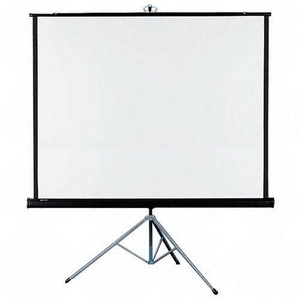 The clunky screen
The clunky screen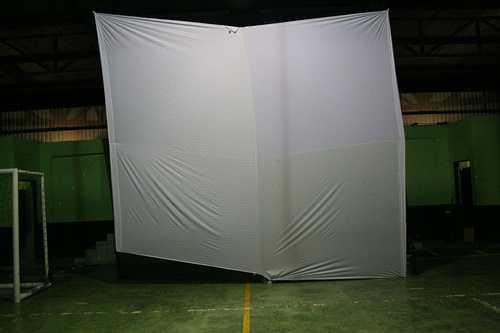 The bed sheet cinema
The bed sheet cinema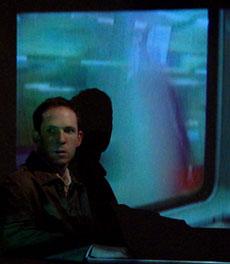 Jo Young in The Garden
Jo Young in The Garden
24th June 2011
Control Fringe Freakery
5th June 2011
Looking Back in Hopefulness
So how do you go about reviewing a Fringe? My natural mouthiness and propensity to wear my soul on my sleeve would make it an easy task. I’ve certainly heard more than a few commentators say it was the best Fringe ever. We didn’t give out any teapots – nothing seemed to shake the foundations of our review team, though consensus has built around the view that the standard of work was up. There was a lot of good and even excellent Fringe theatre out there.
The site-specific experiments largely worked (Small Spaces, One Flew Over the Cuckoo’s Nest, A Live Trail to name but a few).
But it does seem to me that the "Brighton Disease" (a myth?) is still largely in residence. It is this: some theatre companies seem perpetually camped on the verge of their own greatness. It could be a funding thing. It could be a multi-tasking thing (too many projects and part-time jobs and none of it knitting together or fusing in a satisfying manner). Launches into Edinburgh often disappoint because the celebratory open-mindedness here doesn’t always travel well to the land of granite frowns and "Ok, show us what you’ve got". There are some Fringes worth considering – Amsterdam for one, where experimentation is more the norm, but the Edinburgh filter is also a good one. You have to up your game quality wise – dot the artistic "I’s" and cross the experimental "T’s". Work-in-progress will suit Forest Fringe in Edinburgh but not the main venues, especially if billed as a completed work. You’ll get no quarter from the critics up there. Only in Brighton are groups (doing three nights max) naive enough to invite the critics to a first night, where lights and technique aren’t bedded in (even halfway!).
So here’s the paradox of hope: the very things which we love about our wonderfully home-made Fringe, the quest for small spaces producing truly excellent work, are the things that sometimes elude us. We’ll have to imagine ourselves out of cosy Brighton, even as we snuggle down to our first night.
9th May 2011
Crying Wolf on Ticket Sales
Last few tickets…!
Just a few tickets left…!
Nearly sold out…!
Our sector has cried wolf once too often on ticket sales. I’ve attended many a so-called sell-out show in which at least a row of empty seats lay unfilled behind me. And the notion of a ‘sell-out’ show in Edinburgh – which doesn’t mean a true sell out at all – only adds to a growing cynicism. No one believes anymore that there are only a few tickets left. In fact, theatre makers – be warned: When you claim only a handful of seats are left for your show, most potential bottoms believe quite the contrary – that your claim reveals you have swathes of empty seats waiting to be filled, and that your show is, at best, desperate and, at worst, probably awful.
A strange world, eh? So, if you genuinely do only have a few seats to fill, if you authentically are trying to warn punters they might not get in on the door, you might want to explore how social media can genuinely help. And here’s how:
Point 1: People won’t believe you when you claim you are nearly sold out, nor your venue. But they may well believe trusted press sources such as FringeReview or FringeGuru. So develop authentic relationships with selected press and media who will be believed if they retweet your call to your punters.
Point 2: Make use of your Twitter or Facebook followers who are genuinely trusted – trusted punters and members of the public can also effectively pass on your call to buy
But if you lie, you will be lost and the trust isn’t won back easily. Hyping down your empty seats is, these days, self-defeating and now the whole sector is mistrusted. PR companies won’t be much help here – they are, in many cases, trusted least of all. So get crowd-sourcing and use authentic and believed grapevines. Not on any? Then you are screwed.
1st May 2011
Don’t say I didn’t warn you!
I’m hearing from some theatre makers at this year’s Brighton Fringe that ticket sales for their shows are small. One last time: If you seek Facebook commitment, then you will get Facebook commitment, which doesn’t amount to a hill of organic baked beans. Even flyering in Brighton often results in verbalised Facebook-type commitment. Yes, ticket sales will pick up for your shows at the last minute. But you will have to go beyond facebookish laziness and twitter (which means literally a kind of endless and insignificant small talk). And you will have to go even further beyond flyering and dropping your leaflets (99 quid for five thousand special offer) in cafes on top of other peoples’ piles on piles on piles. You’ll have to engage your public, talk to them authentically, beyond the middle-monotonised marketing speak. "It’s gonna be fantastic!". Fantastic actually comes from "fantasy" which subconsciously tells your leafletees you are a fantasist, or even a liar, at worst believing your own publicity.
So, get out there, and talk with humanity, in a real and honest way, and let your enthusiasm work that magic that lies underneath the cloak of binary boorishness, and will always be part of the way we really connect as people.
20th April 2011
Enjoying the Little Backlash
I’m enjoying the little backlash against stage adaptations of films. "It isn’t an adaptation of the film, darling, it’s an adaptation of the novel! Two cases in point underlying this mini-revolution against celluloid transference are "One Flew Over The Cuckoo’s Nest" which is taking place as a site-specific piece on three floors at The Happy Cell, andGet Carter which plays the Hove Centre. Remaining uninfluenced by the films is nigh on impossible and Tanglehead refer to the movie in their interview with us.
James Weisz, director of Get Carter also acknowledges the film’s influence and also the fact that, whatever artistic decisions are made in transferring the’ text’ to the stage, movie images will be in the minds of many of the audience who will have been drawn to the shows on the back of the cult status of the movies. And, of course, cult movies are more and more being used as a way to selll theatre tickets. But it is refreshing to see bolder attempts to recognise that original novels that were made into films have their own powerful virtues as writing, rather than as created film image. Films often simplify, sometimes in ways that capture and even enhance essence. But often that simplification is a kind of dumbing down.
Adapting novels for the stage can fall into the same category but it will be interesting to see how successful these novel-to-stage attempts are at staying clear of film influence (unless it is by conscious choice). A warning to both youngish companies: it is harder than you think. And accidential derivation is not a good idea for creating powerful, quality fringe theatre. Aim at objectivity and look at your own biases and influences, watch for the flavour of the movies seeping accidentally into the evolution of the theatre pieces. I can’t wait to find out if they manage to pull it off.
17th April 2011
The Press Releases Land on Me like Lead Balloons
PR companies should be ashamed of themselves. They bash out press releases for thousands of paying clients hungrily trapped on their books. They arrive in our inbox, often overloaded with megabit, even near-gigabitten images and often badly worded hyperbole. Do they have a standard press release and a clever mobile app where they just insert the name and show title of their latest clients and the press release is vomited into cyberspace, via creaking email lists which try to rip names automatically and insert them into a Dear X?
I’ve been variously addressed as Dear Paul FringeReview, Dear Mr Gubbins, Dear (blank), and we are often confused with FringeGuru.
Then the drivel follows. "Amazing" and "Groundbreaking" mean nothing to humanity as these words and many others have been plundered by PR to the point where vocabulary endlessly recycles itself into an ever-narrower range. Though recently it has all just stalled and is atrophying.
So, when a personalised letter does arrive, that clearly knows who we are, it feels refreshing. If you want a better chance of a review from us, then write to US, not the ether. We are people with individual days and hopes, just like you. If you write into the ether, don’t be surprised if the ether responds with…ether.
Or fill in our online interview form (see the menu on the left of this diatribe), recapture a bit of individuality and, some of you PR companies, do a better job for your clients. McDonaldisation should not infect the arts. But it has..The problem is, this is not a mass market here at the Brighton Fringe – many of these venues seat 50 people or less. People actually can smell the actors and each other. And we reviewers can smell the bullshit a mile away.
22nd March 2011
A short back and sides methinks!
There was a fun headline in the Brighton Argus newspaper today, which claimed the Fringe is trimming back a bit. Don’t groan – when word-play headlines cease, we might as all vanish completely into the binary world of the 666 beast. There are to be no outdoor venues this year and the Fringe is focusing on New Road and Jubilee Square. The reason given is that it is time for the Fringe to be fresh and original. I read that with glee. I punched my Pavilion Gardens Cafe fist into the air, accidentally catching a sandwich-dive-bombing seagull on the beak. Yes, to staying fresh, yes to staying original. And yes, to the promise of moving beyond sponsorship fire-fighting and embracing longer term vision and planning. So, the next sentence in the news piece? The Fringe are already (as part of their "long" term planning) looking towards lighting up the Old Steine, the Level and so forth AGAIN next year.
So, dear Brighton Festival Fringe, will you accept a FringeReview plea to keep your fresh and original promise and ensure that whatever appears in those spaces in 2012 has a fresh and original feel to it? Can we step even a little away from repetition and Edfringe-cloning? How about a theatre space on one of those sites, even a small one? How about some imagining beyond booze and bars and formulae? What can we imagine for those spaces? Can we tap into the eclectic creativity of our (is-it-really-a-) city and ensure that next year whatever you develop with Fringe City doesn’t get suddenly lost if an upside-down cow or a Spiegelclone decides to grace us with their inconsistent and disloyal presence once again? It feels as this year’s trimmed Fringe is somehow more our own, somehow more Brighton (in a good, sustainable sense), and that there is a window of opportunity here. Let’s make the third largest Fringe in the world, the first most original and fresh.
20th March 2011
Certainly not SIlence in Court!
The Old Courtroom played host to the Meet the Press event which was a very laid back affair, but in a good way. I didn’t feel that pitched to and enjoyed what felt like grown up conversations about what was on offer at the venues in the town. Kate Morrison from the Fringe sent us in circles on a speed dating process that was about 8 minutes per venue and was nothing like dating – phew! Venues have gone for product differentiation, diversity, spreading risk and a fair amount of decent looking Fringe theatre.
It’s good to see Tony back at the Old Courtroom, with lessons learned from 2010. (He intends to focus activity on the busier latter part of the week and weekend. I do hope they use the Mondays for a few spontaneous happenings too. Recession? I sensed a mood of hopeulness in the room and people certainly have been energetic with programming. The Nightingale is expanding into various rooms and even into the bar downstairs for its programme, breaking boundaries and experimenting. The Three and Ten leans heavily on comedy but there’s some Fringe theatre on offer and plenty of comedy theatre on offer, not just stand-up. The Marlborough will be one to watch with a a fair amount of interest to Fringe theatre dabblers andregulars. Komedia also has a few theatre offerings as well. And don’t miss the shows at Iambic Arts as well. We’ll be covering as much as we can.
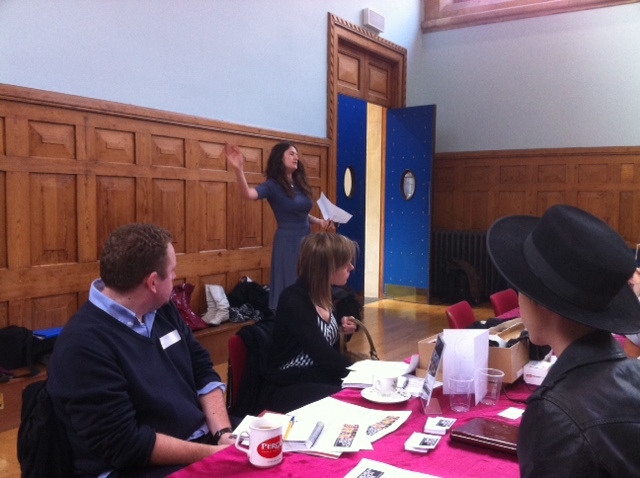 Kate Morrison waves us into action
Kate Morrison waves us into action
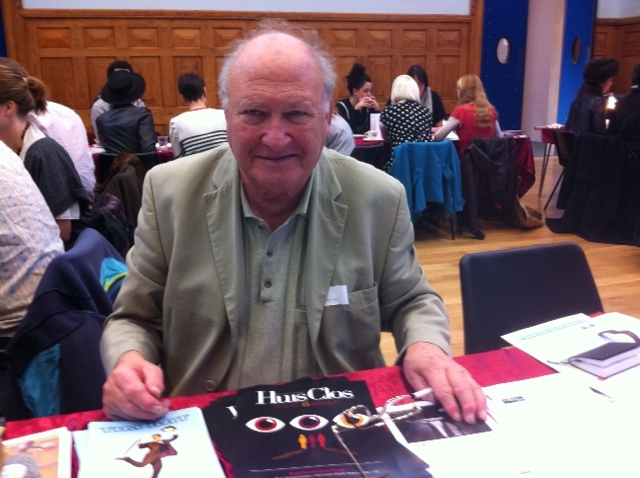 Tony Jaffe back in Court!
Tony Jaffe back in Court!
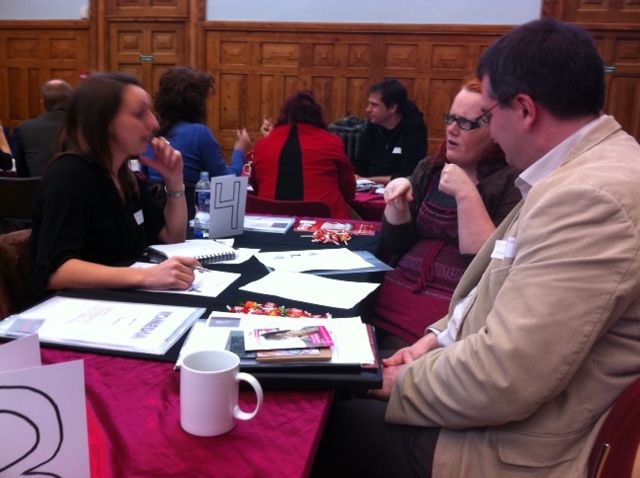 The FringeGuru speed dates Komedia
The FringeGuru speed dates Komedia
And do, towards all things Fringe. It feels like there’s less venues. But that may just be a feeling, we’ve yet to see the numbers. And, as I have said before, I don’t subscribe to the notion that growth is a must. Sometimes less is more and there is a lot of impressive looking home grown work this year, little international theatre, a bit coming from the rest of the UK. I’m looking forward to it.
7th March 2011
Tales from the Marketing Department
I’ve heard tales from my Adelaide grapevine that some very high profile shows have struggled to sell tickets. Mentioning low ticket sales is a kind of sacrilege to Fringe organisers. Anyone who suggests it is a doom-mongerer, even a kind of arts terrorist. This is because Fringe organisers are often primitively commercial. I say primitive because their business models are almost obsessed with being able to demonstrate year-on-year growth. It’s a kind of feverish, even hysterical addiction to the only measure of real success being that "we broke box office records again" – that along side a quantum increase in the number of events registered each year. Sustainability, on these terms, is about recycle bins and reduced paper usage.
Yet sustainability in a broader sense if more subtle, sophisticated and grown up. The marketing speak of the ’80s and’90s, now ditched as old hat by many Generation Y companies, is still the main diet of many arts organisations. Speed dating and alcohol sponsorship, sales strategies and business growth, target markets and PR, all of these things are both tools and also lenses through which we see the world. There are other lenses – uniqueness, firing your "mojo" which is more emergent and malliable than fixed in a business plan document, allowing customers and users to create content rather than dishing it out via graphic designers and PR "experts".
The future of fringes will need to be more sophisticated than box office mania and old-time PR. Art itself has become more inventive, making do with less, more emergent, more authentically multi-media. We are also trying to make sense of the role and place of the arts in a new funding-cut world. Thatcherism and "get on your bike" is only one (old) piece in the equation. The future is one of virtuality, of temporary collaboration, of sustainable growth and even grown-up enjoyment of stability for a while, even of celebrated retrenchment and decline. But it takes a bit of grown up thinking and crazy imagination to get this new paradigm.
7th February 2011
You are not a gadget!
Gadget behaviour ensures you can tick your boxes. Jaron Laniereloquently describes the gadgetisation of the human soul, and the boxes we neatly fit ourselves into. Why struggle with my own web page when I can tick the box quickly and lazily and lock myself down into a facebookish one? The headache is over. As long as I am prepared to be blue and white and modularised, I can sit back and relax. As long as my movements are robotised pokes and thumb-up likes, I can rest easy.
Social media has become water and air to many people, and even if the air is polluted, as long as we don’t cough too much, we aren’t too bothered. This is all well and good for you to promote your shows to your facebook "friends". The problem is that it is avatars we are addressing mostly and not the bums that will probably never sit on our proverbial seats. A hundred people will "like" and make us feel affirmed and good. Fifty may say they will come, and only two will show up. Gadget behaviour is only useful when we can truly control the gadgets – the problem is that on Facebook, even when we make an event it is we who are simply being gadgets as well, and Facebook who are really operating the controls. I’m hearing that Twitter is a better place to promote shows than facebook but that you have to get a lot of meaningful followers – you can spend hours on it. Anecdotal evidence suggests diminishing returns on this platform too as gadgetisation kicks in more and more and also more and more people use it in lazier and lazier ways. Gadgetisation may have some benefits – but lazy gadget behaviour is worse than useless.
A bit like my Ipad…
7th February 2011
The Nature of Hate and a Ten Pound Note
I’ve noticed how, when someone comes out of a theatre having really disliked, dare I say, hated a show, they often these days, link this hate to the price of the ticket. If the ticket was over ten quid, the hate becomes magnified. The distaste is similar to a meal. "I paid twenty quid for that vomit". I think there is a danger here of losing an authentic connection with our love and hate faculties. I’m not a big fan of "hating" in general. It takes a lot more courage to dislike something constructively than to hate it, rooted in a sense of outrage that one has expended hard earned cash. If you truly hate something – if it has aroused that rare, dangerous and precious emotion, then you surely HAVE had your money’s worth. Hate is a strong emotional state and, when authentically aroused, tends to be specific, linked to emotional reaction (and therefore development), and valued in terms of self-knowledge and a wish to get out of the hate state as soon as possible by either putting something right in oneself or the world. Far worse is to pay good money for something that is bland, irritating, quite good, mediocre or generally annoying. I think something that arouses (and it rarely if ever happens) my hate, is well worth a tenner, maybe even eleven…
21st January 2011
Trying New Food – in more ways than one
Poring over the programme for Adelaide Fringe, my fingertip immediately pressed the "Theatre" tab, and I started seeking out shows I either recognised (at least the company) or genres I particularly like. I noticed myself doing this in Edinburgh. People tend to stick to their favourite foods in the theatre world and I feel shocked at finding myself doing the same, being someone who likes to claim he is up for trying out new things in li


















































